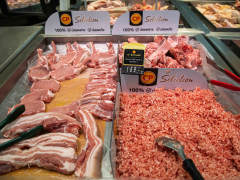Bangkok, Thailand – Stewed, seasoned with sugar and cloves, deep-fried or dished up in a zingy chilli mince – the diets of most Thais are incomplete without pork.
But a $3bn market – supplied nearly entirely by domestic pig farmers – may be about to face competition like never before from the giant hog farms of the world’s third-largest producer, the United States.
Recommended Stories
list of 4 items
- list 1 of 4‘Pink baht’: Thailand’s businesses chase same-sex marriage bonanza
- list 2 of 4Thailand’s economy stumbles as Philippines, Vietnam, Indonesia race ahead
- list 3 of 4Thailand’s economy slows amid declining exports, manufacturing
- list 4 of 4Thailand, where Buddhism reigns, challenges Malaysia for Asia’s halal crown
end of list
While the fine print of the Thai government’s preliminary trade deal with the US is yet to be revealed, some details have emerged.
Washington has a 10,000-item-long wish list of goods it wants to enter Thailand duty-free to reduce its $45.5bn trade deficit with the Southeast Asian country, an imbalance President Donald Trump says unfairly disadvantages US producers.
The list includes pork, corn, soya beans and some fruits.
Shortly after Trump met Thailand’s caretaker prime minister, Anutin Charnvirakul, on the sidelines of the Association of Southeast Asian Nations (ASEAN) summit in Malaysia last month, the White House revealed some of the many strings attached to its trade deal, which set the tariff rate for the kingdom’s exports to the US at 19 percent.
They include Thailand agreeing to “address and prevent barriers to US food and agricultural products in the Thai market”, according to the White House, and a commitment to “expediting access” for US meat and poultry products.
That has panicked Thailand’s pig farmers, who say the industry may not survive a flood of cheaper, subsidised US pork, which is fattened up on ractopamine, a livestock additive banned in many countries, including the kingdom.

If US pork is allowed into Thailand without duties, nothing less than the kingdom’s food security is at stake, according to Worawut Siripun, deputy secretary-general of the Swine Raisers Association of Thailand.
“Producers will not be able to survive and will stop raising pigs. But the risks are not only for farms facing falling pig prices,” Worawut, who has about 10,000 pigs, told Al Jazeera.
“Those who grow feed crops are also affected, as well as animal feed traders, animal feed producers, and veterinary drug sellers. Everyone in the production cycle is impacted.”
Trump had made trade talks with Thailand contingent on Bangkok signing an extended ceasefire agreement with Cambodia.
But in the weeks since meeting Anutin, Thailand has suspended truce talks over alleged Cambodian breaches of the terms of the agreement.
While there are conflicting signals over whether tensions with Cambodia have put Thailand’s trade negotiations with its biggest export destination on the back burner, farmers and livestock companies are bracing for intensified competition.
Thailand’s pork industry has weathered challenges ranging from outbreaks of swine flu to illegal imports from China and Vietnam.
But it faces high costs, largely as a result of government price controls on corn and soya used to feed pigs and other livestock – a measure intended to protect the country’s crop farmers, a key voting bloc.
And like most of Thailand’s





